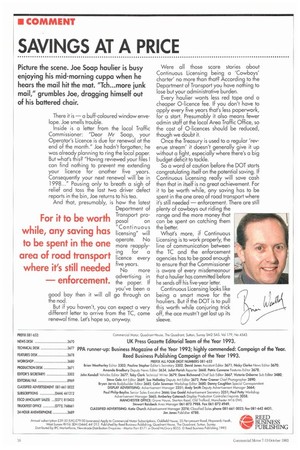SAVINGS AT A PRICE
Page 18

If you've noticed an error in this article please click here to report it so we can fix it.
There it is — a buff-coloured window envelope. Joe smells trouble. Inside is a letter from the local Traffic Commissioner: "Dear Mr Soap, your Operator's Licence is due for renewal at the end of the month." Joe hadn't forgotten, he was already planning to ring the local paper. But what's this? "Having reviewed your files I can find nothing to prevent me extending your licence for another five years. Consequently your next renewal will be in 1998..." Pausing only to breath a sigh of relief and toss the last two driver defect reports in the bin, Joe returns to his tea. And that, presumably, is how the latest Department of Transport pro
For it to be worth
posal on "Continuous licensing" will operate. No more reapplying for a licence every five years. No more advertising in the paper. If you've been a good boy then it will all go through on the nod.
But if you haven't, you can expect a very different letter to arrive from the TC, come renewal time. Let's hope so, anyway.
— enforcement.
Were all those scare stories about Continuous Licensing being a 'Cowboys' charter' no more than that? According to the Department of Transport you have nothing to lose but your administrative burden. Every haulier wants less red tape and a cheaper 0-licence fee. If you don't have to apply every five years that's less paperwork, for a start. Presumably it also means fewer admin staff at the local Area Traffic Office, so the cost of 0-licences should be reduced, though we doubt it. Once the Treasury is used to a regular 'revenue stream' it doesn't generally give it up without a fight, especially where there's a big budget deficit to tackle. So a word of caution before the DOT starts congratulating itself on the potential saving. If Continuous Licensing really will save cash then that in itself is no great achievement. For it to be worth while, any saving has to be spent in the one area of road transport where it's still needed — enforcement. There are still plenty of cowboys out riding the range and the more money that can be spent on catching them the better.
What's more, if Continuous Licensing is to work properly, the line of communication between the TC and the enforcement agencies has to be good enough to ensure that the Commissioner is aware of every misdemeanour that a haulier has committed before he sends off his five-year letter. Continuous Licensing looks like being a smart move for the hauliers. But if the DOT is to pull this worth while conjuring trick off, the ace mustn't get lost up its sleeve.




























































































